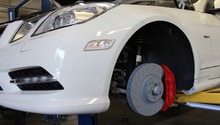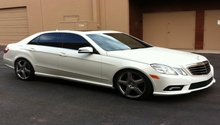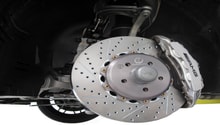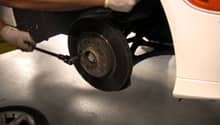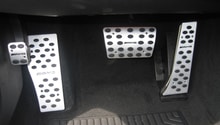Mercedes-Benz E-Class and E-Class AMG: Why Do My Brakes Squeak?
Squeaky brakes should not be a problem in your Mercedes-Benz E-Class and E-Class AMG w211. Unfortunately, it seems to be all too common. This causes owners concern, frustration, and in some extreme cases, embarrassment. Find out how to get rid of squeaky brake problems with these diagnostic and repair procedures.
This article applies to the Mercedes-Benz E-Class and E-Class AMG w211 (2002-2009).
Your car has less than 30,000 miles, and as you slow down steadily to a stop, you hear it—a squeal echoing from the brake pads. This might only occur when you lightly touch the brakes, or even when you slam on the pedal. Whatever the case may be, squeaky brakes do not belong in a Mercedes E-Class vehicle. There are several reasons why brakes may start squeaking, which includes issues with brake dust or warped rotors. On vehicles with low mileage, the case usually lies between the contact area of the brake pads and calipers. However, more serious issues may be at fault, so the entire braking assembly should be inspected. Follow these steps to narrow down the problem, and repair any brake squeaks or noises.

Materials Needed
- Hydraulic jack and jack stands
- Tire iron
- Brake lubricant and cleaner
- 3/8" socket and ratchet
- T-21 Torx screwdriver
Step 1 – Check for brake dust
Brake dust is created from normal use of the vehicle's brake pads. Often times, the dust can etch the rotor or get stuck in between the rotor and brake pad mating area, causing a squeaking noise. Follow these steps to diagnose and repair the problem:
- Use a tire iron to loosen the 17mm lug nuts on the wheels.
- Use hydraulic jacks to lift the vehicle, and set it down onto jack stands. Start with the two front wheels, and then the rear wheels.
- Remove the lug nuts and wheels.
- Visually inspect the brake pads and rotors for dust.
- Thoroughly spray the calipers, pads, and rotors with brake cleaner.
- Re-install the wheels, and test drive your car.
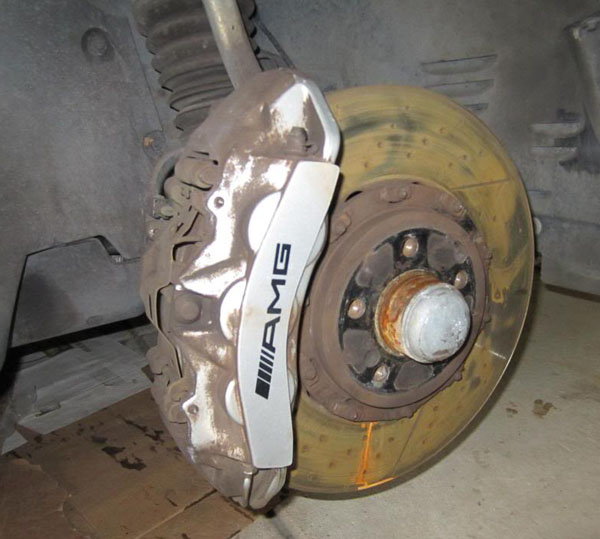
Pro Tip
Brake dust is a common culprit for squeaks, but will not greatly impact the braking system. This procedure simply acts as a solution to silence the brakes, and may not restore or enhance brake performance.
Step 2 – Check the caliper pistons
The brakes' caliper pistons may be rubbing against the brake pads. Apply brake lubricant on the caliper.
- Use a tire iron to loosen the 17mm lug nuts on the wheels.
- Use hydraulic jacks to lift the vehicle, and set it down onto jack stands. Start with the two front wheels, and then the rear wheels.
- Remove the lug nuts and wheels.
- Use a socket and ratchet to loosen the lower 3/8" bolt of the brake caliper. Then, flip it up to free the brake pads.
- Thoroughly apply brake caliper lubricant onto each brake pad.
- Reassemble the brake assembly, mount the wheels, and test drive your car.

Pro Tip
Brake lubricant is normally a short term solution. However, for many drivers, this fix has lasted for several thousand miles before the squeak returned.
Step 3 – Replace the rotors and brake pads
The rotors may be warped, which means they need to be turned/resurfaced or replaced. A warped rotor, rare in many cases, causes the brakes to wear unevenly, creating a squeaky sound, vibrations, and/or other stopping issues. Due to thus uneven wear, the brake pads must also be changed.
- Safely raise and secure the vehicle.
- Loosen and remove the 17mm lug nuts.
- Remove the caliper bracket and brake pads.
- Use a T-27 Torx screwdriver to remove the rotor mounting screws.
- Pull the rotor off.
- Take the rotors to a machinist, and have them turn/resurface the rotors. You can also purchase new rotors.
- Re-install the rotors and caliper brackets.
- Install the new brake pads, and apply brake lube.
- Install the calipers.
- Mount the wheels, and test drive your car.
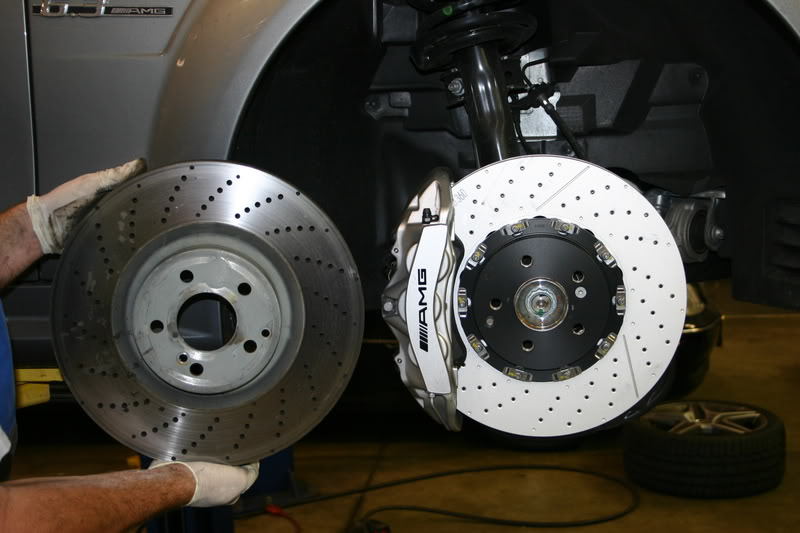
Related Discussions
- Brakes Squeaking - Need Help - MBWorld.com
- Best Technique to Clean Brake Calipers - MBWorld.com
- Brake Pads and Rotors - MBWorld.com

